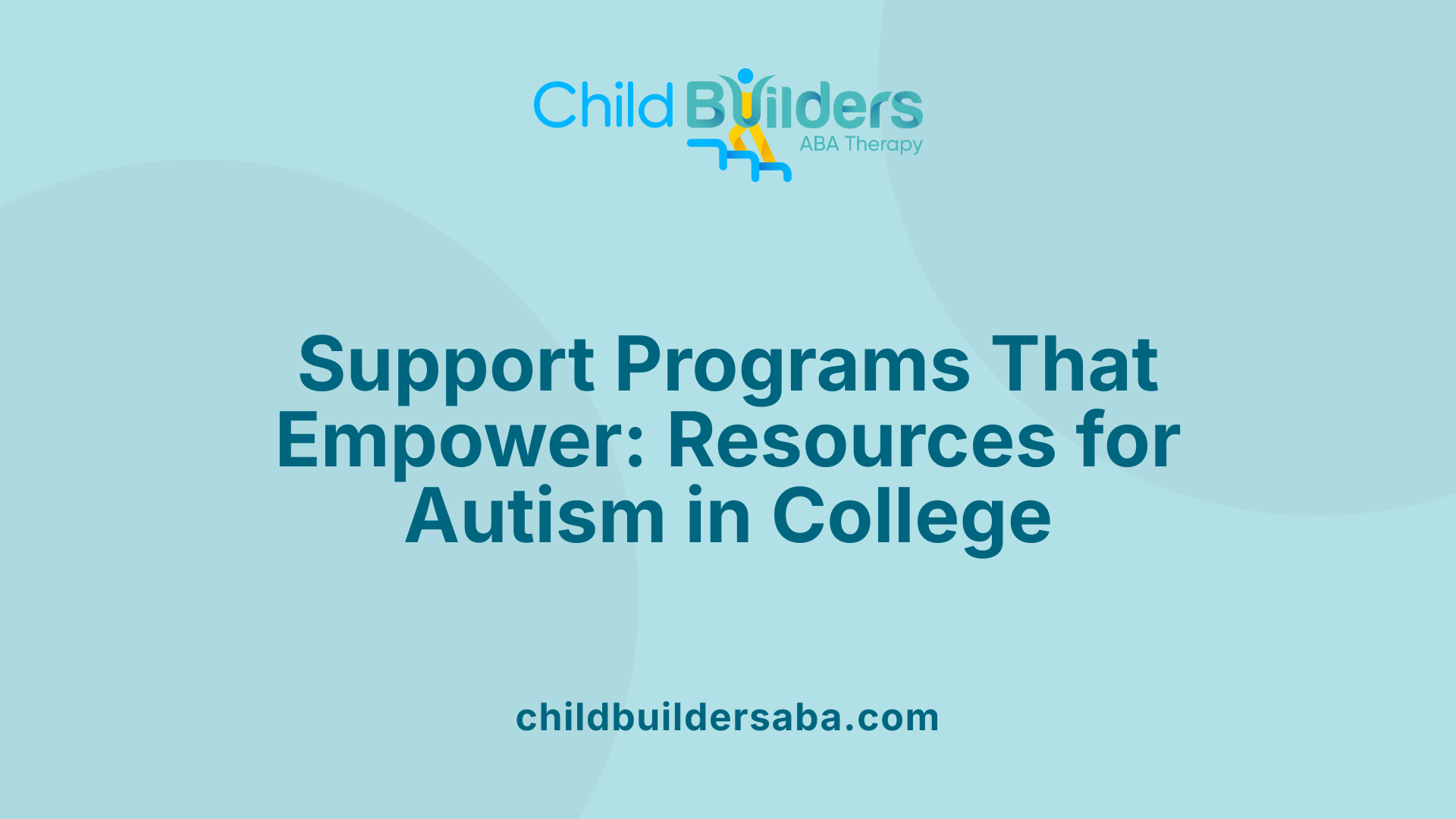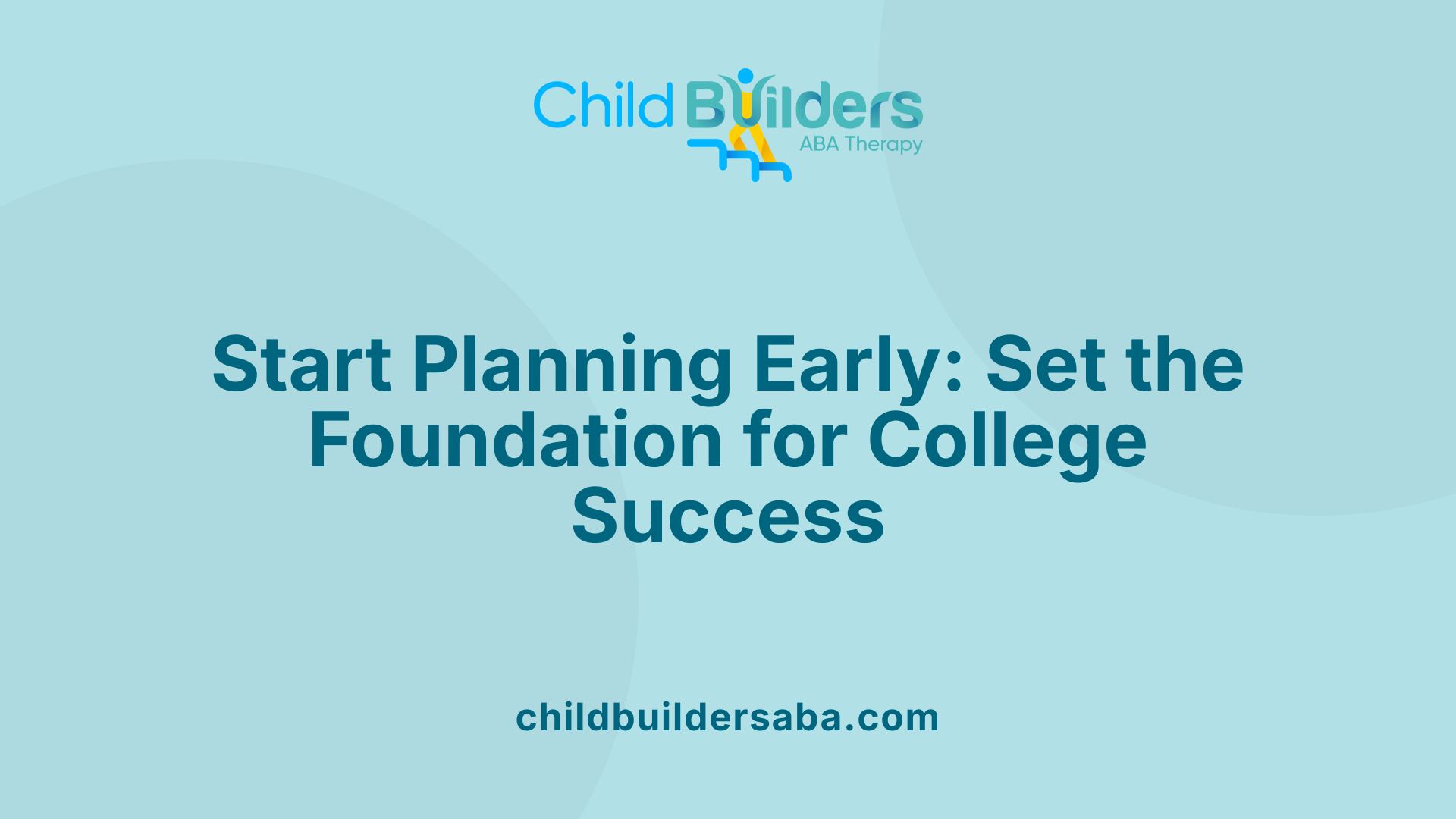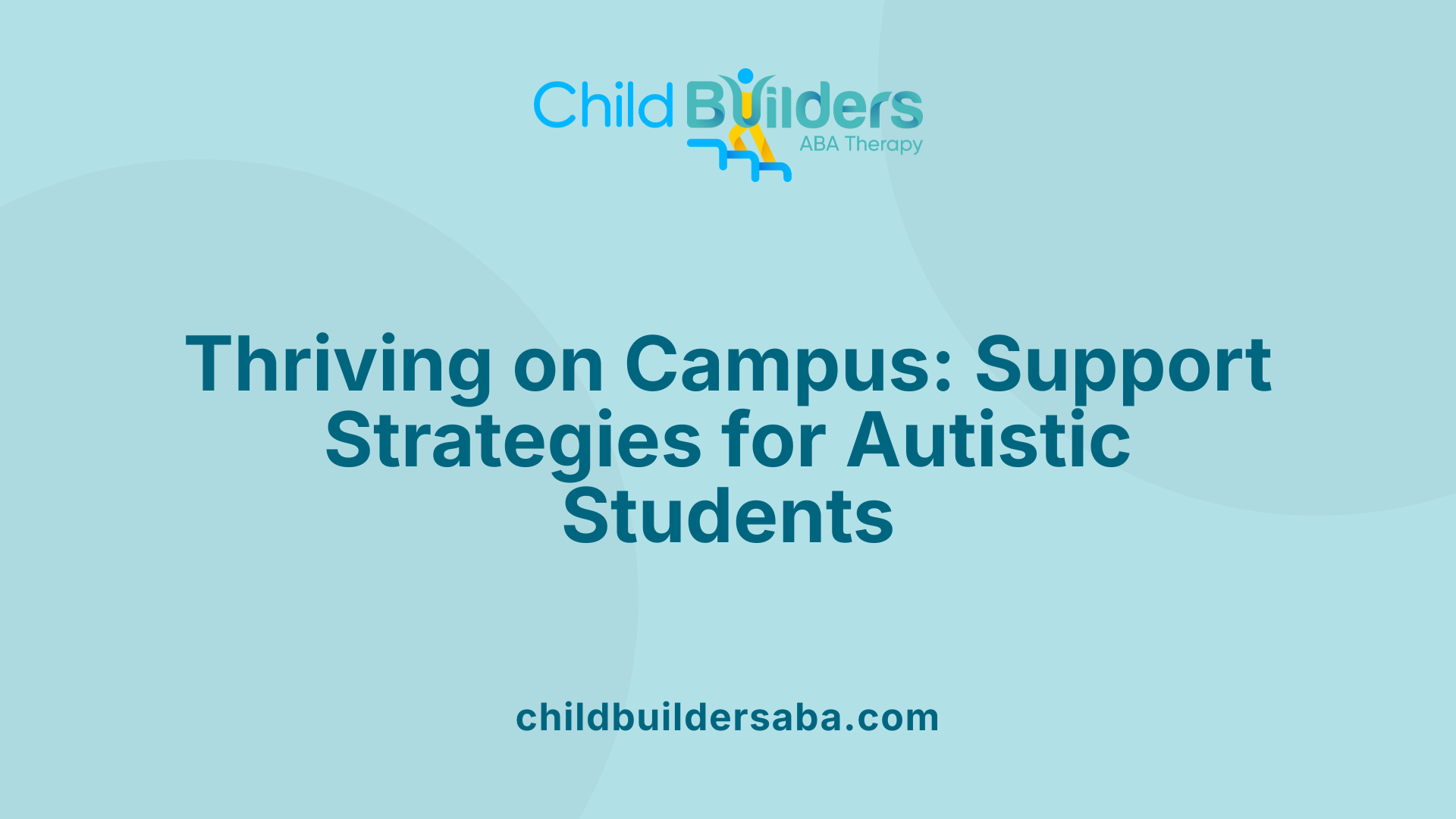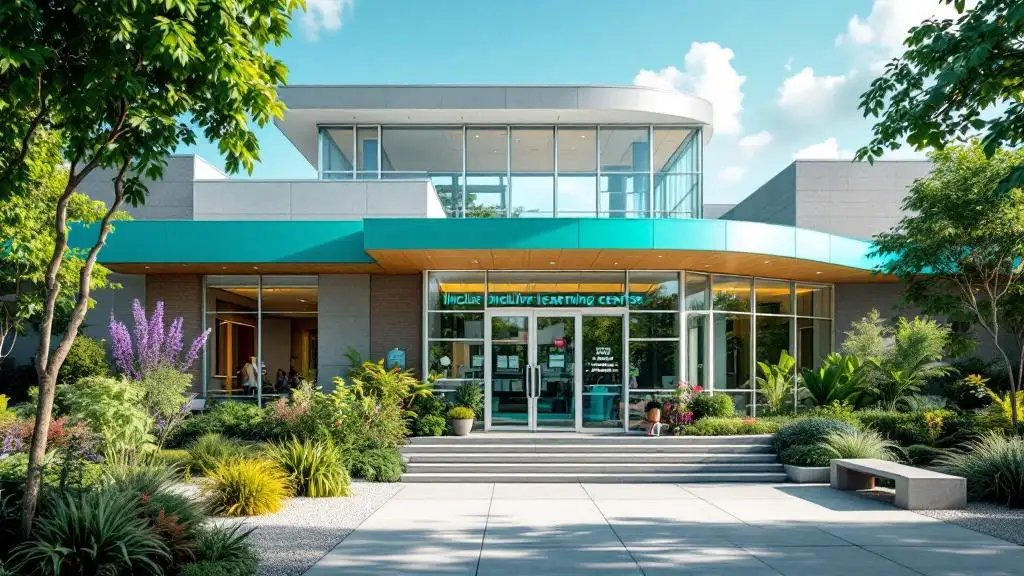Colleges For Autistic Students

Understanding the Landscape of Autism Support in College
As awareness and inclusivity in higher education grow, numerous colleges have established specialized programs and resources to support autistic students. These initiatives aim to create accessible environments, foster independence, and promote success both academically and socially. This article explores the characteristics of autism-friendly college environments, available resources, and practical guidance for students and parents planning for higher education.
Resources and Programs Supporting Autistic Students in Higher Education

What resources and programs are available at colleges to support autistic students?
A wide array of support systems exists across colleges and universities to help students on the autism spectrum succeed academically, socially, and personally. These programs are tailored to address individual needs, providing personalized coaching, social skills enhancement, and mentorship opportunities. Many institutions have specialized programs that not only focus on academic achievement but also on developing life skills, fostering independence, and promoting social integration.
For example, the Autism Spectrum Disorders College Transition and Support Program at the University of Alabama offers targeted services to facilitate their transition into college life. Similarly, the Spectrum Scholars program at the University of Connecticut allows students to craft personalized support plans emphasizing social competence. Western Kentucky University’s Kelly Autism Program provides classroom accommodations and mentorship, alongside social support initiatives.
Support services are often comprehensive, including academic coaching, social skills groups, peer mentoring, counseling, and community outings. These are designed to help students navigate the complexities of college life while building essential skills for independence and success.
Furthermore, specialized programs like Landmark College in Vermont serve students with various learning differences, including autism, offering degree programs in a supportive environment. Other notable institutions include Beacon College in Florida, dedicated exclusively to students with learning differences, and Defiance College in Ohio, which supports students through its ASD Affinity Program.
Several college support initiatives are funded through grants, making them free or low-cost for students, while others might entail specific charges. The role of organizations such as the College Autism Network (CAN) is pivotal, as they provide resources, research, and a support network to connect students, families, and educators.
Individualized support services
Support programs are often designed around personalized plans that cater to academic, social, and emotional needs. These customized services include note-taking assistance, assistive technology, social communication coaching, and independent living skills training.
For example, the College Supports Program at Eastern Michigan University provides tailored social and academic services, including residential coaching and executive function training. Such arrangements ensure students receive the necessary tools for academic achievement and social well-being.
Social skills training and mentorships
Building social competence is vital for college students with autism. Programs typically incorporate social skills groups, peer mentoring, and group therapy sessions. At Rochester Institute of Technology’s Spectrum Support Program, students engage in social events and skills development courses designed to foster peer connections.
Mentorship is another critical component, with many programs assigning peer mentors or coaches to guide students through academic and social challenges. These mentors often serve as relatable role models, helping students develop confidence and independence.
Funding models for programs
Funding for these specialized programs varies. Some are grant-funded or supported by university budgets, thus provided free of charge to students. Others may require students to pay tuition or fees for participation. For instance, Golden West College’s Autism Program (CAP) requires students to enroll in at least one academic course and adhere to specific enrollment criteria.
Additional support programs are often funded through federal or state grants, ensuring broader access and sustainability. The diversity in funding models allows institutions to implement support services tailored to their resources and student needs.
Role of organizations like the College Autism Network
The College Autism Network plays a crucial role in advancing support for autistic college students. It connects stakeholders, facilitates research, and organizes annual summits that promote knowledge sharing among educators, researchers, and students.
CAN maintains a comprehensive database of autism-specific college programs nationwide and offers free resources like the Autism Career Empowerment curriculum aimed at enhancing employment outcomes.
Through advocacy, training, and resource sharing, organizations like CAN aim to foster inclusive campus environments where students on the spectrum can thrive academically and socially.
| Program Name | Location | Services Offered | Funding Model | Additional Notes |
|---|---|---|---|---|
| Bridges to Adelphi | Adelphi University | Social, academic, vocational support | Grant-funded/free | Supports neurodiverse students |
| Spectrum Support Program | Rochester Institute of Technology | Individual support, social events | University-funded | Emphasizes peer coaching |
| Kelly Autism Program | Western Kentucky University | Classroom accommodations, mentorship | University-funded | Promotes inclusion |
| College Supports Program | Eastern Michigan University | Personalized academic, social support | University-funded | Residential coaching |
| Autism Spectrum Disorders College Transition | University of Alabama | Transition support, life skills | Grant-funded | Focus on self-advocacy |
These programs, supported by dedicated resources and strategic organization, are instrumental in creating pathways for students with autism to succeed in higher education. They continue to evolve, providing a model for inclusive, supportive learning environments.
Characteristics of Autism-Friendly College Environments
What are characteristics of autism-friendly college environments?
Autism-friendly college environments are designed to support students with Autism Spectrum Disorder (ASD) through a variety of tailored services and inclusive practices. These campuses focus on creating a welcoming atmosphere that accommodates the unique needs of neurodiverse learners. One of the primary features is the availability of comprehensive support services, such as academic coaching, social skills training, and life skills development. Programs like the Bridges to Adelphi at Adelphi University and the College Supports Program at Eastern Michigan University exemplify this, offering dedicated mentorship, social skills groups, and vocational support.
Inclusive campus culture is another hallmark, emphasizing awareness, acceptance, and collaboration. Many institutions foster diversity through programming and advocacy, helping students build social connections and feel valued within the university community. Support extends to sensory-friendly spaces—specialized classrooms and quiet zones designed to reduce sensory overload, making campus life more comfortable. Universities like Landmark College and Cal Poly provide sensory accommodations, assistive tech, and designated quiet areas.
Support for social integration and independence is vital for student success. Colleges offer peer mentoring, group activities, and social events tailored for students on the spectrum. For example, programs such as the Spectrum Support Program at RIT and the MoSAIC program at the University of Tennessee Chattanooga provide social and executive functioning skills development to foster independence.
Early transition planning and promoting self-advocacy are integral to these environments. Institutions encourage early workforce and college readiness through transition services starting as early as high school, enabling students to develop negotiation skills for accommodations and their educational path. Organizations like the College Autism Network (CAN) and specific campus programs act as vital partners, providing resources, research, and training aimed at continuous improvement.
Most notably, these environments aim to reduce barriers and enhance access, ensuring that autistic students can focus on their academic and personal growth. They sustain a culture that values neurodiversity, supports individualized learning, and fosters independence, ultimately empowering students to succeed both during and after their college years.
Financial Support and Scholarships for Autistic Students
Are there scholarships available for autistic students considering college?
There are numerous scholarship opportunities specifically designed for students on the autism spectrum who are pursuing higher education. These financial aid options vary widely in terms of award amounts, eligibility requirements, and application procedures.
Many of these scholarships aim to reduce financial barriers and promote diversity and inclusion within college communities. Examples include the Autism Can Do Scholarship, which offers grants to help fund educational costs, and the Organization for Autism Research Scholarship, dedicated to supporting students with autism in their academic pursuits.
Other notable scholarships include the Kelly Law Team Autism Scholarship, providing substantial awards for students demonstrating leadership and advocacy in autism communities. Grant amounts can range from a few hundred dollars to over five thousand dollars, making them accessible to a broad range of students.
In addition to these, some scholarships are targeted towards special groups such as students of color, tech enthusiasts, or those enrolled in specific programs like vocational training. These opportunities are often funded by private foundations, non-profit organizations, corporations, and even universities themselves.
The availability of these scholarships significantly impacts access to higher education for autistic students. They not only alleviate financial burdens but also encourage students to pursue their academic and career aspirations, fostering greater independence and community participation.
Applying for these scholarships typically involves submitting proof of diagnosis, academic records, personal statements, and sometimes recommendations. Prospective applicants are advised to carefully review eligibility criteria and grant deadlines, and to seek assistance from college disability services or guidance counselors familiar with autism-specific aid.
Overall, the landscape of funding options for autistic students is diverse and growing, reflecting increasing recognition of the importance of supporting neurodiverse individuals in higher education.
| Funding Source | Type of Support | Typical Award Range | Additional Notes |
|---|---|---|---|
| Private Foundations | Scholarship funding | $650 - $5,000 | Focused on inclusion, diversity, and specific career fields |
| Non-profit Organizations | Grants, specific scholarships | Varies | Often require personal essays and proof of diagnosis |
| Universities | Internal scholarships, grants | Varies | Sometimes include matching funds or in-kind support |
| Corporate Sponsors | Specialized awards, fellowships | Varies | Some focus on STEM fields or community leadership |
How do these funding sources influence higher education?
The availability of scholarships and grants significantly lowers financial barriers for autistic students, enabling broader access to college and vocational programs. Financial support encourages more students to pursue post-secondary education, which might otherwise be inaccessible due to cost.
Funding also promotes diversity within college campuses by supporting students from various backgrounds, including those with additional demographic considerations. These programs help foster an inclusive environment where neurodiverse students can thrive academically and socially.
Furthermore, scholarship programs often include mentorship and community engagement opportunities, which bolster students’ confidence and integration into college life. By supporting their educational journey financially and socially, these programs play a key role in helping autistic students realize their potential and succeed in their chosen careers.
Supporting Students with Autism Through Accommodations and Services
Do colleges assist students with autism with accommodations and support services?
Yes, colleges in the United States actively help students on the autism spectrum by providing a broad range of support services and accommodations. These efforts are designed to facilitate successful transitions into college, promote independence, and ensure that students can participate fully in academic and social life.
Many higher education institutions offer specialized programs tailored for autistic students. For example, Drexel University’s Autism Support Program and the University of Alabama’s ASD College Transition Support Program provide services like peer mentoring, social skills training, and group workshops focused on self-advocacy and daily living skills.
Support programs often include personalized academic coaching, social skills development groups, and mentorship opportunities. Landmark College and Beacon College, both dedicated specifically to students with learning differences including autism, provide comprehensive support involving executive functioning strategies, social coaching, and customized accommodations.
Federal laws such as the Americans with Disabilities Act (ADA) and Section 504 of the Rehabilitation Act require colleges that accept federal funding to provide reasonable accommodations. These can include extended time on exams, distraction-free testing environments, note-taking assistance, and housing arrangements like private dorm rooms.
What’s more, organizations such as the College Autism Network (CAN) work toward improving access and experiences for college students with autism by sharing resources, conducting research, and advocating for inclusive practices. Many colleges also offer transition planning starting as early as age 14, helping students develop self-advocacy, organizational, and social skills needed for college success.
Examples of typical accommodations and services
| Accommodation or Service | Description | Beneficiary |
|---|---|---|
| Extended test time | Extra time allowed for exams to reduce anxiety or sensory overload | Students with processing or sensory issues |
| Distraction-free testing rooms | Quiet, low-stimulation spaces for test-taking | Students with sensory sensitivities |
| Note-taking support | Provided by peer or technology to help record lectures | Students with organizational challenges |
| Assistive technology | Screen readers, speech-to-text tools, or specialized software | Students with sensory or communication needs |
| Housing accommodations | Private or sensory-friendly dorm rooms | Students needing sensory regulation |
| Social skills groups | Workshops and structured social activities | Students seeking to develop social competence |
| Peer mentoring | One-on-one support from trained peer mentors | Students adjusting socially and academically |
Support programs and services offered
Support services vary widely across institutions and may include academic coaching, social skills training, vocational support, and mental health counseling. Some programs are free, while others involve fees or are funded through grants.
Examples include:
- The College Supports Program at Eastern Michigan University offers personalized social, academic, and life skills coaching.
- The University of Connecticut’s SEAD Program allows students to craft individual support plans focused on social development.
- The Autism Spectrum Support Program at the University of Arkansas helps with registration, note-taking, and campus integration.
- The College Autism Spectrum organization provides consulting, training, and resources for campus staff and students.
Legal frameworks and compliance
Colleges are legally required to accommodate students with disabilities, including autism, following federal laws such as the ADA and Section 504. These laws mandate accessible educational environments and reasonable modifications to standard policies. Colleges must engage in an interactive process with students to determine appropriate accommodations.
Institutions are also encouraged to develop inclusive programs and training for faculty and staff, fostering a supportive environment that promotes the success of autistic students. Organizations like CAN advocate for ongoing improvements in these practices and invest in research to enhance support systems.
In conclusion, educational institutions across the country are increasingly committed to providing tailored services that recognize and support the unique needs of students with autism. These efforts help to narrow the opportunity gap and promote a more inclusive, accessible higher education landscape.
Transition Planning and Practical Tips for Parents and Students

What should parents and students know about planning for college as an autistic individual?
Preparing for college involves early and thoughtful planning, especially for students on the autism spectrum. Experts recommend beginning this process around age 14 to ensure the student develops the skills needed for a smooth transition.
A key component is fostering self-advocacy. Students should learn how to communicate their needs and understand their rights to accommodations. This includes disclosing their diagnosis to the college's disability services, providing necessary documentation, and understanding the range of supports available.
Making use of organizational tools like planners, visual schedules, and alarms can help students manage their schedules and responsibilities effectively. Participating in social skills groups or social activities during high school and early college years supports social development.
Exploring specialized college programs designed for autistic students, such as those at Adelphi University, Drexel, Rutgers, and others, provides access to tailored academic, social, and independent living support. These programs often include mentorship, counseling, and skill-building activities.
Parents and students should also consider alternatives like community colleges or transitional programs. These options can provide a less stressful environment to build independence and academic skills, serving as a steppingstone toward four-year colleges.
Ongoing communication with campus disability services is vital throughout college. Regular planning and adjustment ensure that supports remain aligned with the student’s evolving needs.
Overall, early planning combined with utilizing available resources and supports fosters confidence and independence, helping students reach their higher education goals.
| Aspect | Description | Additional Support Options |
|---|---|---|
| Early Planning | Begins around age 14, focusing on skill development | Transition programs, community colleges |
| Self-Advocacy | Disclose diagnosis, secure accommodations | Disability services consulting |
| Organizational Tools | Planners, visual schedules, alarms | Social skills training |
| Specialized Programs | Tailored academic and social support | Adelphi, Drexel, Rutgers, Landmark College |
| Alternative Pathways | Community colleges, transitional programs | Bridge programs, early intervention |
| Ongoing Support | Regular communication with campus services | Mentoring, counseling, peer groups |
Understanding the importance of these strategies can greatly enhance a student's success and experience in higher education.
Academic and Career Pathways Suitable for Autistic Students

What degree paths are often suitable for autistic students interested in helping others or working in related fields?
Autistic students passionate about supporting others or engaging in helping professions can explore a variety of degree options that align with their interests and strengths. Fields such as psychology, child development, sociology, and special education are popular choices. These programs prepare students to work directly with individuals with ASD or other needs, fostering careers in counseling, therapy, social work, or education.
For students with strong visual or analytical skills, degrees in computer science, engineering, or lab sciences can also be fitting. Such fields open doors to technical roles, research positions, and innovative problem-solving careers often valued in support or developmental services.
In addition to traditional academic pathways, vocational training and certification programs provide alternative routes into skilled trades. Careers in automotive repair, technical support, arts and crafts, or other practical fields can be fulfilling and offer independence.
Many colleges with specialized support services help students develop social skills, independence, and academic success, which are crucial for thriving in employment related to helping professions. These programs often include mentorship, social skills training, and transition planning, ensuring students are well-prepared for their career journey.
Choosing a degree or career path that leverages individual strengths, interests, and accessible support systems can enable autistic students to find meaningful roles that are both personally satisfying and professionally sustainable.
| Degree Focus | Related Careers | Support Systems & Resources | Notes |
|---|---|---|---|
| Psychology | Counseling, Therapy | Academic coaching, social skills training | Prepares for mental health professions |
| Child development | Early intervention, Education | Mentorship, practical experience | Focuses on developmental support |
| Sociology | Community work, Advocacy | Peer mentoring, group support | Emphasizes societal impact |
| Special Education | Teaching, Support services | Transition programs, assistive tech | Tailored for working with neurodiverse populations |
| Computer Science/Engineering | Data analysis, Tech support | Campus accommodations, mentoring | Suited for analytical thinkers |
| Vocational training | Skilled trades | Industry certifications | Options include arts, crafts, mechanics |
Navigating Career Development and Support
Support programs at various colleges aim to foster not just academic achievement but also self-advocacy and independence. Such programs provide mentoring, social skills development, and career guidance tailored for autistic students.
In addition, organizations like the College Autism Network advocate for systemic support, ensuring that students with autism can transition successfully from education to employment. These resources offer insights into labor market trends, workplace accommodations, and self-employment opportunities.
By combining academic pursuits with robust support networks, autistic students can effectively navigate their career development, ultimately entering roles that utilize their strengths and contribute meaningfully to their communities.
Supporting High-Functioning Autistic Students on Campus

How do colleges support high-functioning autistic students?
Colleges across the United States have developed a variety of programs and support services specifically designed to help students on the autism spectrum succeed academically, socially, and personally. These initiatives recognize that high-functioning autistic students often possess significant talents but may still face challenges related to organization, social interaction, and sensory sensitivities.
Many institutions offer specialized programs such as the College Supports Program at Eastern Michigan University, which provides personalized social, academic, and life skills support. Similarly, the College Success Program at Eastern University focuses on maximizing potential through tailored academic and social development, including campus integration and social skills building.
Support strategies include academic accommodations like extended test-taking time, distraction-free environments, and assistive technologies such as screen readers and note-taking services. Visual aids like checklists, social narratives, and visual schedules help students manage daily and academic tasks effectively.
Environmental adjustments also play a crucial role. Many colleges modify campus settings to reduce sensory overload—quiet zones, sensory-friendly rooms, and flexible housing arrangements such as private dorm rooms are common. These adjustments create a welcoming environment conducive to learning and socializing.
Mentoring and peer support are vital components of these programs. Peer mentoring initiatives, such as those offered through the Spectrum Support Program at Rochester Institute of Technology or the COMPASS Program at Fairleigh Dickinson University, help students develop social skills, navigate campus life, and build meaningful relationships. These programs foster a sense of belonging and provide guidance from experienced peers.
Moreover, colleges often collaborate with external organizations like the College Autism Network (CAN), which offers resources, research, and advocacy to improve support systems for students on the spectrum. CAN hosts events, shares best practices, and connects stakeholders to promote inclusive campus environments.
To summarize, the support for high-functioning autistic students encompasses personalized academic services, environmental modifications, peer mentoring, and resource collaboration, all aimed at empowering students to reach their full potential and thrive in higher education settings.
Support strategies and accommodations | Social and environmental adjustments | Mentoring and peer support | Resources for ongoing success
| Support Area | Examples & Services | Additional Details |
|---|---|---|
| Academic Accommodations | Extended test time, distraction-free rooms, assistive tech | Tailored support based on individual needs |
| Social Skills Development | Social narratives, groups, coaching | Enhances social interaction and communication |
| Environmental Modifications | Sensory booths, quiet zones, flexible housing | Reduce sensory overload, promote comfort |
| Mentoring & Peer Support | Peer mentoring programs, social clubs | Foster community, prevent isolation |
| External Resources & Collaborations | Autism Speaks, College Autism Network | Provide training, research, and advocacy |
Supporting high-functioning students requires a multifaceted approach that emphasizes personalized support, a welcoming environment, and continuous resource access. This comprehensive support network helps students navigate academic pressures and social challenges, supporting their independence and success in college.
For further information, searching “Supporting high-functioning autistic students in college” can yield additional resources, program details, and community stories that highlight successful strategies and innovations in higher education support systems.
Fostering Inclusive, Supportive Higher Education Environments
Creating autism-friendly colleges requires a comprehensive approach that combines specialized programs, accommodations, inclusive campus culture, and ongoing support systems. Organizations like the College Autism Network play a pivotal role in fostering collaboration, research, and resource sharing. With these efforts, higher education can become a truly accessible and empowering space for autistic students to thrive academically, socially, and personally, paving the way for successful futures.
References
- College Programs for Students with Autism
- College Programs - College Autism Spectrum
- 19 Best Colleges for Neurodivergent Students - IvyWise
- College Autism Network
- How to Find the Right College for Autistic Students - SPARK for Autism
- Building Bridges - LeTourneau University
- Autism & College - Autism Research Institute
- Landmark College | Home
- Looking for a college with more robust supports for students with ...
- 30 Best Colleges for Students on the Autism Spectrum





































































































